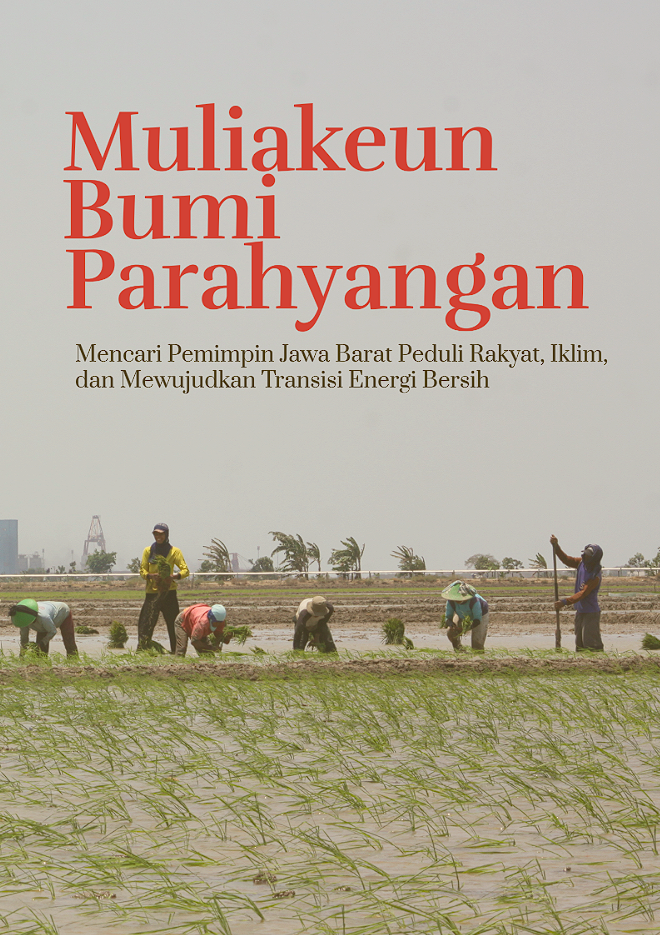Jakarta, Thursday, October 19, 2023 – “Uncertainty surrounding climate crisis management and energy transition is growing stronger as we approach the 2024 presidential election,” said Ginanjar Ariyasuta, Coordinator of Climate Rangers Jakarta. “This is because none of the presidential candidates have shown a strong commitment to addressing the climate crisis and energy transition.”
According to Ginanjar, young people are increasingly fed up with the behavior of elites who prioritize their own interests, disconnected from the real struggles of the people. “The climate crisis and energy transition are issues that affect the lives of the people, yet they seem indifferent,” he emphasized. “In response, young people are planning simultaneous actions across various cities in Indonesia to urge presidential candidates to take serious action on the climate crisis and energy transition.”
The *Power Up* movement, Ginanjar explained, is part of a global civil society initiative pushing political elites to implement serious policies to phase out fossil fuels and transition to community-based renewable energy.
The reluctance of political elites to commit more seriously to addressing the climate crisis and energy transition is closely tied to campaign funding from the fossil fuel industry (oil, gas, and coal). According to Bhima Yudhistira, Director of the Center of Economic and Law Studies (CELIOS), conflicts of interest that hinder energy transition policies stem from the lack of transparency in campaign funding for election candidates. “A CELIOS study shows that 89% of young voters want accelerated closure of coal-fired power plants (PLTU), and 60% want renewable energy to dominate the national energy mix.”
However, the demands of the younger generation are often ignored, overshadowed by the interests of fossil fuel businesses funding election candidates. “Dark money from dirty energy is often difficult to trace. As a result, young voters are often seen merely as vote targets, while their aspirations are not accommodated in concrete action programs by electoral candidates. Campaigns related to energy transition, for example, are rarely heard in public appearances by presidential and legislative candidates,” said Bhima.
According to the Chairman of the Student Executive Board (BEM) at the University of Indonesia (UI), the voice of the younger generation will be highly relevant, especially in the 2024 elections. “Approximately 52% of the total votes will come from young people. Therefore, the 2024 elections should be a gateway to realizing the dreams of these decisive voices, including those related to environmental issues. It’s pointless to campaign daily about being close to young people, to compete for their votes, if they fail to design programs or take a stand on environmental issues that will significantly impact the future of young people.”
Co-Initiator of *Bijak Memilih* (Vote Wisely), Andhyta Firselly Utami, highlighted the importance of having the right framework to assess and choose parties or presidential candidates who will push for policies aligned with our hopes. “As someone who has worked on economic and environmental issues for the past decade, I see that we are entering a new momentum where the discussion must move beyond ‘whether serious action is needed’ (the answer is a resounding yes) to ‘how to design the right and appropriate solutions to address these challenges in the Indonesian context.’ Presidential candidates must compete in presenting the best plans.”
“Through the *Bijak Memilih* initiative, we aim to ensure that the public, especially young voters who make up the largest percentage, can make choices based on the right framework and quality information, not just viral trends,” added Andhyta Firselly Utami.
Meanwhile, Campaigner for 350 Indonesia, Suriadi Darmoko, revealed that Indonesia already has many commitments to climate action. “There is a lot of homework for the elected president, especially to take swift and just climate action through energy transition and increasing the share of renewable energy in the national energy mix. The breakthroughs offered by presidential candidates to achieve energy transition targets are crucial for us to know, as we have yet to see how existing commitments will be implemented. For example, what policy frameworks will be built to accelerate the energy transition? How will communities be involved in the energy transition? These are just some of the many questions that must be answered by the candidates and addressed once elected.”
The Power Up action serves as a reminder to all presidential candidates that the younger generation is watching and will hold them accountable for their commitments to a sustainable and just energy transition.










